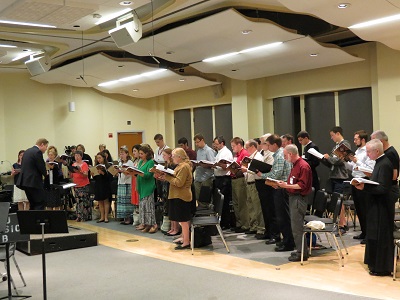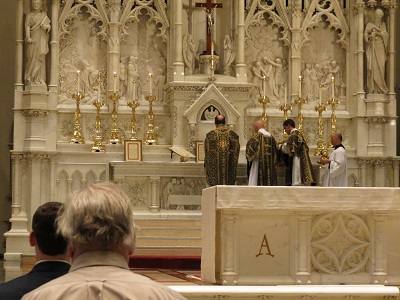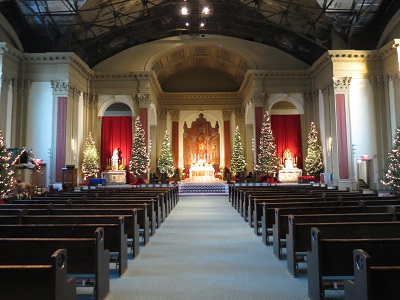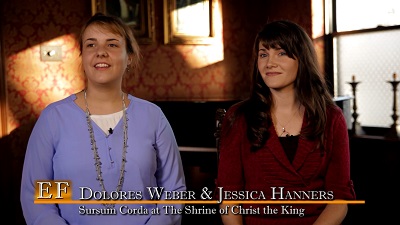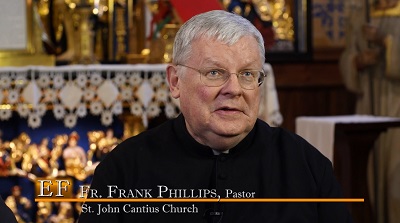Courtesy of one of my colleagues, HERE are the papers (in French, German and Italian) given at the "Underground" Synod of the French, German, and Swiss Bishops' conference.
As my friend concluded: Let us pray for the Church. Indeed.
[Hat tip to E. Echeverria]
Saturday, July 25, 2015
Tridentine Masses coming to metro-Detroit and east Michigan this week
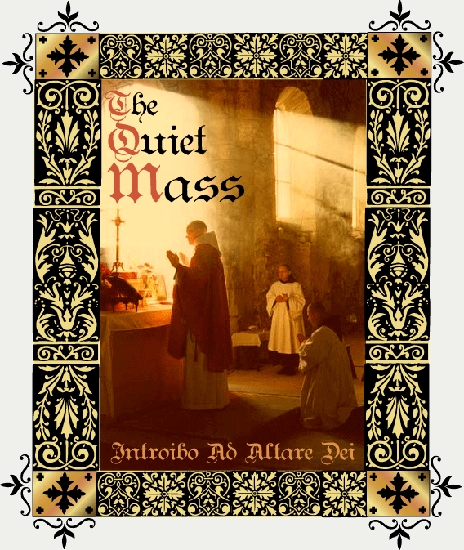
Tridentine Masses This Coming Week
-
Sunday
- Sun. 07/26 8:30 AM: High Mass at St. Josaphat, Detroit (9th Sunday after Pentecost - 2nd class)
- Sun. 07/26 9:30 AM: High Mass at Assumption Grotto, Detroit (9th Sunday after Pentecost - 2nd class)
- Sun. 07/26 9:45 AM: High Mass at the Chapel of the Academy of the Sacred Heart, Bloomfield Hills (9th Sunday after Pentecost - 2nd class)
- Sun. 07/26 2:00 PM: High Mass at St. Alphonsus Church, Windsor, Canada (9th Sunday after Pentecost - 2nd class)
- Sun. 07/26 3:00 PM Low Mass St. Matthew Catholic Church, Flint (9th Sunday after Pentecost - 2nd class)
Monday
- Mon. 07/27 7:30 AM: High or Low Mass (varies) at Assumption Grotto, Detroit (Feria - 4th class or St. Pantaleon - 4th class)
- Mon. 07/27 7:00 PM: Low Mass at St. Josaphat, Detroit (Feria - 4th class or St. Pantaleon - 4th class)
- Tue. 07/28 7:00 AM High or Low Mass (varies) at Assumption Grotto, Detroit (Sts. Nazarius & Celsus, St. Victor I & St. Innocent I - 3rd class)
- Tue. 07/28 7:00 PM: High Mass at Holy Name of Mary, Canada (Sts. Nazarius & Celsus, St. Victor I & St. Innocent I - 3rd class)
- Wed. 07/29 7:30 AM: High or Low Mass (varies) at Assumption Grotto, Detroit (Sts. Nazarius & Celsus, St. Victor I & St. Innocent I - 3rd class)
- Thu. 07/30 7:30 AM: High or Low Mass (varies) at Assumption Grotto, Detroit (Feria - 4th class or Sts. Abdon & Sennen - 4th class)
- Fri. 07/31 7:30 AM: High or Low Mass (varies) at Assumption Grotto, Detroit (St. Ignatius Loyola - 3rd class)
- Fri. 07/31 7:00 PM: Low Mass at St. Josaphat, Detroit (St. Ignatius Loyola - 3rd class)
- Sat. 08/01 7:30 AM: High or Low Mass (varies) at Assumption Grotto, Detroit (Saturday of Our Lady - 4th class, or Holy Machabees - 4th class, or St. Peter in Chains - 4th class, or Immaculate Heart of Mary - 3rd class) [First Saturday]
- Sun. 08/02 9:30 AM: High Mass at St. Josaphat, Detroit (10th Sunday after Pentecost - 2nd class)
- Sun. 08/02 9:30 AM: High Mass at Assumption Grotto, Detroit (10th Sunday after Pentecost - 2nd class)
- Sun. 08/02 9:45 AM: High Mass at the Chapel of the Academy of the Sacred Heart, Bloomfield Hills (10th Sunday after Pentecost - 2nd class)
- Sun. 08/02 2:00 PM: High Mass at St. Alphonsus Church, Windsor, Canada (10th Sunday after Pentecost - 2nd class)
- Sun. 08/02 3:00 PM High Mass St. Matthew Catholic Church, Flint (10th Sunday after Pentecost - 2nd class)
Tuesday
Wednesday
Thursday
Friday
Saturday

Sunday, July 19, 2015
Tridentine Community News - Sacred Music Colloquium 2015 Report (Duquesne University, Pittsburgh), Detroit weekday EF Mass times

"I will go in unto the Altar of God
To God, Who giveth joy to my youth"
Tridentine Community News by Alex Begin (July 19, 2015):

Sacred Music Colloquium 2015 Report
The Church Music Association of America held its 25th Annual Sacred Music Colloquium at Duquesne University in Pittsburgh, Pennsylvania June 29-July 4. Regular readers of this column may recall that this is one of the premier Latin Liturgy events of the year, with over 200 musicians participating.
The week was comprised of talks and opportunities for training, both in classroom format and one-on-one. Speakers included Fr. Jonathan Robinson, founder of the Toronto Oratory; Fr. Robert Pasley, pastor of North America’s first diocesan priest-led Extraordinary Form parish, Mater Ecclésiæ in Berlin, New Jersey; and Windsor’s very own Matthew Meloche, currently Music Director of Phoenix, Arizona’s Ss. Simon & Jude Cathedral.
Attendees could choose from several tracks. Some of the world’s most prominent Catholic music directors led breakout choirs specializing in chant or polyphony: John Robison, Music Director of St. Paul’s Choir School in Cambridge, Massachusetts (featured in Extraordinary Faith, Episode 2, and pictured with his class, below); Charles Cole, Assistant Music Director of the London Oratory and Music Director of the London Oratory School and London Oratory Junior Choir; Scott Turkington, globetrotting Gregorian Chant instructor; and David Hughes, Music Director of St. Mary Parish in Norwalk, Connecticut (the latter three are all featured in upcoming episodes of Extraordinary Faith). Private instruction on the organ was available from Dr. Ann Labounsky of Duquesne University and Dr. Paul Weber of St. Martin of Tours Parish in Louisville, Kentucky. All of these instructors are experienced with the Extraordinary Form.
The major liturgies of the week were held at St. Paul Cathedral, a grand edifice in pristine condition, still containing a splendid High Altar, four Side Altars, and a Communion Rail. A Latin Mass in the Ordinary Form was celebrated ad oriéntem at the High Altar on Thursday, followed later in the day by Vespers in the Extraordinary Form. On Friday, a Solemn High Requiem Mass in the Extraordinary Form was offered (photo below), followed by Absolution at the Catafalque. At each of these liturgies, three to five choirs, each led by the aforementioned music directors, sang portions of the music. One choir was located in the choir loft, while the others were scattered around the church (see photo below). A particularly stirring moment was when all five choirs joined together to sing the Dies Iræ during the Requiem Mass. Imagine 200 professional-caliber voices singing that piece.
Curious to see more? Our crew from Extraordinary Faith was present to film the major liturgies of the Colloquium. We also interviewed several speakers and guests. While in Pittsburgh we also shot segments at local historic churches and interviewed some prominent members of the Pittsburgh Tridentine Mass community. We expect to be able to produce two episodes from the content shot. The 2016 Sacred Music Colloquium will be held in St. Louis, Missouri. More information will be posted about that event as plans are solidified.
Tridentine Masses This Coming Week
- Mon. 07/20 7:00 PM: Low Mass at St. Josaphat (St. Jerome Emiliani, Confessor)
- Tue. 07/21 7:00 PM: Low Mass at Holy Name of Mary (St. Laurence of Brindisi, Confessor & Doctor)
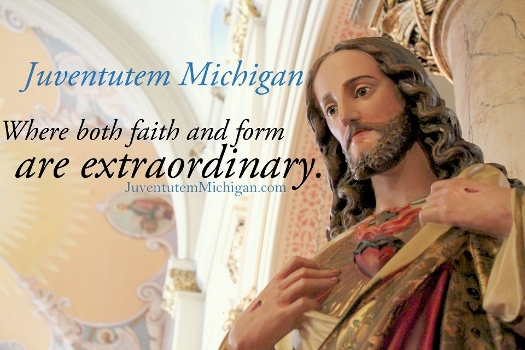
Latin Masses coming this week to metro Detroit and eastern Michigan

Tridentine Masses This Coming Week
-
Sunday
- Sun. 07/19 8:30 AM: High Mass at St. Josaphat, Detroit (8th Sunday after Pentecost - 2nd class)
- Sun. 07/19 9:30 AM: High Mass at Assumption Grotto, Detroit (8th Sunday after Pentecost - 2nd class)
- Sun. 07/19 9:45 AM: High Mass at the Chapel of the Academy of the Sacred Heart, Bloomfield Hills (8th Sunday after Pentecost - 2nd class)
- Sun. 07/19 2:00 PM: High Mass at St. Alphonsus Church, Windsor, Canada (8th Sunday after Pentecost - 2nd class)
- Sun. 07/19 3:00 PM Low Mass St. Matthew Catholic Church, Flint (8th Sunday after Pentecost - 2nd class)
Monday
- Mon. 07/20 7:30 AM: High or Low Mass (varies) at Assumption Grotto, Detroit (St. Jerome Emiliani, Confessor - 3rd class)
- Mon. 07/20 7:00 PM: Low Mass at St. Josaphat, Detroit (St. Jerome Emiliani, Confessor - 3rd class)
- Tue. 07/21 7:00 AM High or Low Mass (varies) at Assumption Grotto, Detroit (St. Laurence of Brindisi, Confessor & Doctor - 3rd class)
- Tue. 07/21 7:00 PM: High Mass at Holy Name of Mary, Canada (St. Laurence of Brindisi, Confessor & Doctor - 3rd class)
- Wed. 07/22 7:30 AM: High or Low Mass (varies) at Assumption Grotto, Detroit (St. Mary Magdalene - 3rd class)
- Thu. 07/23 7:30 AM: High or Low Mass (varies) at Assumption Grotto, Detroit (St. Apollinaris - 3rd class)
- Fri. 07/24 7:30 AM: High or Low Mass (varies) at Assumption Grotto, Detroit (Feria - 4th class, or St. Christina - 4th class)
- Sat. 07/25 7:30 AM: High or Low Mass (varies) at Assumption Grotto, Detroit (St. James the Greater - 2nd class)
Sunday
- Sun. 07/26 8:30 AM: High Mass at St. Josaphat, Detroit (9th Sunday after Pentecost - 2nd class)
- Sun. 07/26 9:30 AM: High Mass at Assumption Grotto, Detroit (9th Sunday after Pentecost - 2nd class)
- Sun. 07/26 9:45 AM: High Mass at the Chapel of the Academy of the Sacred Heart, Bloomfield Hills (9th Sunday after Pentecost - 2nd class)
- Sun. 07/26 2:00 PM: High Mass at St. Alphonsus Church, Windsor, Canada (9th Sunday after Pentecost - 2nd class)
- Sun. 07/26 3:00 PM Low Mass St. Matthew Catholic Church, Flint (9th Sunday after Pentecost - 2nd class)
Tuesday
Wednesday
Thursday
Friday
Saturday

Saturday, July 18, 2015
Reduced summer schedule
For the next three weeks, I will be on a reduced summer schedule at this blog. I intend to do my best to keep abreast of things and to keep up with the regularly scheduled Latin Mass schedules and Tridentine Community News. But I will doubtless post less frequently.
Orémus pro invicem
Orémus pro invicem
Friday, July 17, 2015
The last Catholic left on earth
A friend recently sent me a book review with the following paragraph in it:
"I once asked in confession what was the very least, the minimalist interpretation of that great promise [of Christ that the gates of Hell would not prevail against the Church]. I was told that at its very least, in order for it to be fulfilled, at the Parousia there would be one Catholic left on earth. I was instructed to make sure that even if there was no one else left, I would be that last one. I suggest that the same instruction goes for all of us."
Voris vs. Matt on the proper Catholic attitude toward SSPX
Michael Voris, "The Vortex - Rome has not Spoken" (Church Militant, July 15, 2015)
Michael Matt, "News from Remnant TV ... Obsessed with the SSPX: Michael Voris & the CMTV Witch Hunt" (The Remnant, July 16, 2015)
Michael Matt, "News from Remnant TV ... Obsessed with the SSPX: Michael Voris & the CMTV Witch Hunt" (The Remnant, July 16, 2015)
Labels:
Catholic opinion,
Confusion,
SSPX,
Traditionalists,
Voris
Thursday, July 16, 2015
R.R. Reno on the strengths and weaknesses of Laudato Si
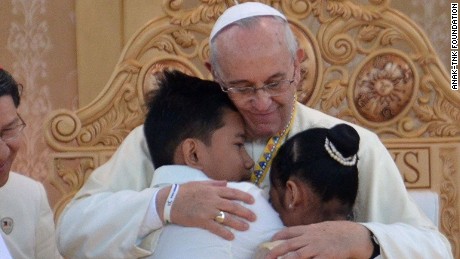
R.R. Reno, editor of First Things, says in his substantial article that the conjunction of concerns in the Pope's recent encyclical is fitting [emphasis mind]:
The end of the Cold War has allowed global capitalism to develop as the world’s dominant system. Capitalism has many virtues, but there are “externalities,” as economists call them—social and environmental harms and costs that may end up being very significant. Global capitalism also resists political control, posing a challenge to existing governmental and regulatory institutions. Most important of all, perhaps, this global system requires and encourages a technocratic elite that now dominates political and cultural debates. As a result, it’s increasingly hard to imagine an alternative.Pope Francis, he says, discusses these issues and more, making "a much-needed effort to grasp and respond to today’s global realities." Then he adds, "But, taken as a whole, Laudato Si falters." While advancing strong criticisms of the secular technological project driving modern capitalism, many aspects of the alternative he proposes "draw upon the achievements and methods of that very project."
Pontiffs who venture beyond instructing the faithful to exhorting the whole world by means of book-length encyclicals open themselves to scrutiny and criticism and manipulation by the media from multiple quarters in ways unimaginable in the past. Reno, a faithful Catholic, offers filial criticisms (as well as appreciations) of points in the Pope's publication. Interesting. Here is an abridgement:
Chapter 1, “What Is Happening to Our Common Home,” outlines Francis’s take on environmental issues.... If it were just a matter of landfills, industrial waste, and the failure to recycle, we’d be okay.... The issue is much larger, however. Francis addresses the mother of all problems—and the central ecological issue today—which is global climate change.
The position put forward is the worst-case consensus. It holds that the fossil fuel–dependent economies of the developed and developing world have set in motion a process of global warming that will accelerate.... The rhetoric of crisis runs throughout the document. “Doomsday predictions can no longer be met with irony or disdain. We may well be leaving to coming generations debris, desolation and filth.”
The encyclical then turns to a diagnosis of the theological and social-cultural roots of the ecological crisis, spelling out its social dimensions. Chapter 2, “The Gospel of Creation,” calls for us to acknowledge creation as a gift from God, our Father....
... God-forgetfulness is at the root of our global problems today: social, economic, and ecological.
This line of criticism follows a long tradition....
Chapter 3, “The Human Roots of the Ecological Crisis,” analyzes what Francis takes to be the perverse spiritual logic of a scientific-technological culture....
... A “Promethean vision of mastery” and “excessive anthropocentrism” lead to the same ecological and social disasters as God-forgetfulness.
At this point, Francis develops his fullest account of the crisis he believes we face.... Global capitalism is a Shiva-like force in human history—the Great Destroyer driving global warming.
... Francis is keen to point out that this suppression of larger ethical and spiritual questions allows the rich and powerful to disguise their unjust advantages and ratchet up still further their global oppression of the poor.
Given this dark picture of the global system, it’s not surprising that Francis calls for “a new synthesis,” “radical change,” and “a bold cultural revolution.”
There’s something to be said for his particular suggestions in Chapters 4 (“Integral Ecology”) and 5 (“Lines of Approach and Action”). Calls for action to address climate change are needed, as is a spiritual alternative to consumerism. But my concern is with the cogency of the encyclical as a whole. A great deal of what is commended as an alternative to the global system sounds to me like just another version of it.
Labels:
Catholic opinion,
Church history,
Climate,
Confusion,
Encyclical,
Environment,
Pope Francis,
Population,
Theology,
Vatican II
Wednesday, July 15, 2015
A "Fighting Irish" Archbishop

New York's first Archbishop, John Hughes, was apparently not one for the "softer, gentler" approach when his churches and a convent were burned down by anti-Catholics in the 19th century. He did not, like Mr. Obama, call his constituency to a "thoughtful introspection and self-examination" to consider whether they may have offended their attackers or harbored any latent hostilities that might have provoked their anger. He did not, like Cardinal Kasper, call for a more "merciful" and "pastoral" approach toward sinners. No. The response of this native Irish fighter was to punch back and defend his flock. His response was to threaten the burning of protestant churches if one more Catholic church burned.
Let's be clear, writes Adfero, in "Catholic Archbishop threatens violent uprising against enemies" (RC, July 14, 2015), "we are not suggesting violence against those who persecute us today. What we are saying emphatically is that we need more than the weak-kneed responses of those of Wuerl, Cupich or the Great Silence of Pope Francis on the attack on true marriage in the United States, Ireland and elsewhere."
Adfero also suggests: "click here to listen to a wonderful sermon on His Excellency John Hughes."
Labels:
Anti-Catholicism,
Church history,
Clerics,
Culture wars,
Inspiration,
People,
Priests,
Protestants
A picture may be worth a thousand words, but what does it mean?

This is a photo of Evo Morales Ayma, the president of Bolivia, presenting the medal he had created, named after the "martyred" leftist Jesuit Luis Espinal, the cold war-era Marxist Liberation Theologian who designed this crucifix, composed of a crucifix mounted on a Communist hammer and sickle.
Some maintain that the Bolivian president placed the Holy Father in a difficult position by this gift.
Others, like Antonio Socci, suggest that this was hardly the case, since the ceremonies were arranged beforehand so that the 'gift' could hardly have been a surprise; that Morales, as a significant head of state, did not have the attitude of a 'provoker', but rather was an admirer of Bergoglio; and, as in this photo, Bergoglio "smiled courteously at the explanation of the symbols and wore that obscene representation round his neck."
Socci reports yet another 'gift' from Morales: when Bergoglio came down from the aircraft’s stairway, Morales placed round his neck a traditional 'chuspa' - the container for coca-leaves which is used in Andean countries - and that news from the Bolivian government already had caused quite a stir by reporting that the Pope intended to chew on some coca-leaves when he arrived in Bolivia.
The site “Dagospia”, which has a flair for trash, rightly commented: “The only things missing were a Che Guevara T-Shirt and one of Bob Marley’s bongos,” says Socci - and then asks: "Is it not devastating to degrade the figure of the Pope to this extent?"
For the record, Rorate notes that Pope Francis has personally stated that he was not offended by Hammer-and-Sickle "crucifix", and explicitly acknowledged the Marxism of its Jesuit originator -- and praised him.
According to Socci, "Bergoglio’s trip to South America helps us understand, why, precisely in that once very Catholic continent, the Church over the last decades is in freefall, with a statistical collapse of membership which has no equal in the world. Where priests and bishops are syndicates and demagogues, people feel no attraction for the faith. If the discourses of the ecclesiastics resemble those of Evo Morales – why continue going to church? It is for this reason, that the religious question and the attraction for the supernatural is conveyed through other forms of religiosity and many, many people are abandoning the Catholic Church."
Rorate calls this image "the defining image" of Pope Francis' pontificate, although others may be inclined to point out numerous other candidates as well (the Holy Father addressing Kenneth Copeland's Protestant Pentecostal congregation comes to mind).

Labels:
Confusion,
Culture wars,
Politics,
Pope Francis,
Signs of the times
Monday, July 13, 2015
Cantius Youth Choir to sing at EF High Mass at Assumption Grotto on July 16th at 1:00 PM
Via Te Deum Laudamus! (July 13, 2015):
I received a message from Br. Matthew Schuster, who is a 'son of Grotto' that he is helping to lead a pilgrimage with the youth choir from St. John Cantius in Chicago into Canada and they will be stopping at Assumption Grotto for a special 1:00 p.m. EF High Mass on July 16, 2015 - the Feast of Our Lady of Mount Carmel.
The roughly 50-person youth choir will sing Missa Brevis in F by Gabrieli, Salve Regina of Poulenc and Ave Maria of Ramiro Real.
This Mass is open to anyone who can attend. This notice comes late, but hopefully not too late for those who are free. Please spread the word.
I received a message from Br. Matthew Schuster, who is a 'son of Grotto' that he is helping to lead a pilgrimage with the youth choir from St. John Cantius in Chicago into Canada and they will be stopping at Assumption Grotto for a special 1:00 p.m. EF High Mass on July 16, 2015 - the Feast of Our Lady of Mount Carmel.
The roughly 50-person youth choir will sing Missa Brevis in F by Gabrieli, Salve Regina of Poulenc and Ave Maria of Ramiro Real.
This Mass is open to anyone who can attend. This notice comes late, but hopefully not too late for those who are free. Please spread the word.
Labels:
Latin Mass,
Liturgy,
music,
News,
People
Taylor Marshall on two possible options at the October Synod
Taylor Marshall, "Could Gay Marriage be PASTORALLY Approved at Synod on the Family?" (July 13, 2015)
As a reader pointed out, the following comment by a Spanish-speaking woman named Cindy is telling and, I would add, disturbing (#
As a reader pointed out, the following comment by a Spanish-speaking woman named Cindy is telling and, I would add, disturbing (#
I want to believe that the Holy Spirit will prevent this from happening although I really believe that only a supernatural miracle could prevent it from happening. I'm Hispanic and I've heard many conversations our current pope had while he was bishop in Argentina. They are on the internet and in Spanish language. I've also viewed a disturbing video of him while pope, where he says we should not try to bring people into the Church. He talks in Spanish and I understood CLEARLY what he said and that's exactly what he said. He said we should walk with people, not try to make them Catholic and let God do all the work of bringing them into the Church. One of my concerns with the holy father is that apparently, he's tainted. What do I mean by that? I think throughout his life and while he's been a cleric, he's experienced pharisee type, hypocritical Catholics and they have left a real sour taste in his mouth. Those experiences have led him to equate orthodoxy with a lack of mercy, a lack of love and "rigidity". I heard a story he told of very pious women in his parish (when he was a priest), who were extremely pious, yet he found out they expected and seemingly approved of their married sons also having access to their house maids as "more than maids". He was shocked and taken aback by their hypocrisy. He's also recounted the legalism of going to confession because he brushed his teeth before Mass and swallowed a little of the water within the time allotted for fast, and believed it to be a serious sin. I think he is suspicious of orthodox Catholics. Why is that important? Well, because he will tend to side with those whom he perceives to be merciful and charitable.
Sunday, July 12, 2015
Tridentine Community News - EWTN's Extraordinary Faith Episode 5: Chicago Part 2 of 2; Mass schedule

"I will go in unto the Altar of God
To God, Who giveth joy to my youth"
Tridentine Community News by Alex Begin (July 12, 2015):

Extraordinary Faith Episode 5: Chicago Part 2 of 2
EWTN will be broadcasting Extraordinary Faith Episode 5 – the second of our two episodes filmed in Chicago – this Wednesday, July 15 at 3:00 AM and 6:30 PM Eastern time. [Previous episodes of Extraordinary Faith can be viewed at this site.]
Chicago has more weekly Extraordinary Form Mass sites than any other city in North America. Our first stop in this episode is St. Mary of Perpetual Help (pictured below), an historic church which has been ramping up its own Extraordinary Form Mass. Celebrant Fr. Bart Juncer takes us on a tour and explains how his church is making traditional liturgy an integral part of the parish experience, undaunted by the fact that there are numerous other prominent Tridentine Mass sites in the city.
Canon Matthew Talarico of Chicago’s Shrine of Christ the King explains how the Institute of Christ the King has undertaken the restoration of the former St. Gelasius Church. Just an empty shell when they arrived, the Institute has managed to outfit the structure with sufficient fixtures to allow for solemn liturgies and a full parish life, while they fundraise to make a more permanent restoration of the structure.
Around metro Detroit we hear a lot about Juventútem, the group of young adults who support the Tridentine Mass. It’s not the only such group. The Institute of Christ the King, which does an excellent job of marketing itself in print and electronic media, has established its own young adult group “brand,” Sursum Corda. There are chapters of Sursum Corda at various Institute parishes. We interview two young ladies from the Sursum Corda group at Chicago’s Shrine of Christ the King, who explain the social and devotional activities their organization makes available.
Incidentally, Chicago is perhaps the only city with chapters of both young adult groups: There is also a chapter of Juventútem based at St. John Cantius Parish.
A visit to Chicago would not be complete without a stop at St. John Cantius. One of America’s showcase parishes for the Extraordinary Form, St. John Cantius actually was threatened with closure when pastor Fr. Frank Phillips arrived there in the 1980s. Instead of throwing in the towel, Fr. Phillips relates how he embarked upon an ambitious campaign to “Restore the Sacred,” which has completely revitalized the parish. Both Ordinary and Extraordinary Forms of the Mass are celebrated there, with an emphasis on reverent worship. A community of priests, the Society of St. John Cantius, has been established. Assistant Pastor Fr. Scott Haynes explains the role of the parish’s numerous choirs and pipe organs in supporting their multifaceted sacred music program.
Tridentine Masses This Coming Week
- Mon. 07/13 7:00 PM: Low Mass at St. Josaphat (Feria)
- Tue. 07/14 7:00 PM: Low Mass at Holy Name of Mary (St. Bonaventure, Bishop, Confessor, & Doctor)

Tridentine Masses coming to metro Detroit and eastern Michigan this week

Tridentine Masses This Coming Week
-
Sunday
- Sun. 07/12 8:30 AM: High Mass at St. Josaphat, Detroit (7th Sunday after Pentecost - 2nd class) [From July 12 to August 2, St. Josaphat Masses will be at 8:30AM instead of 9:30AM. The August 16th Mass will be at 9:00AM, and on August 16th, the regular 9:30AM schedule will resume.]
- Sun. 07/12 9:30 AM: High Mass at Assumption Grotto, Detroit (7th Sunday after Pentecost - 2nd class)
- Sun. 07/12 9:45 AM: High Mass at the Chapel of the Academy of the Sacred Heart, Bloomfield Hills (7th Sunday after Pentecost - 2nd class)
- Sun. 07/12 2:00 PM: High Mass at St. Alphonsus Church, Windsor, Canada (7th Sunday after Pentecost - 2nd class)
- Sun. 07/12 3:00 PM High Mass St. Matthew Catholic Church, Flint (7th Sunday after Pentecost - 2nd class)
Monday
- Mon. 07/13 7:30 AM: High or Low Mass (varies) at Assumption Grotto, Detroit (Feria - 4th class)
- Mon. 07/13 7:00 PM: Low Mass at St. Josaphat, Detroit (Feria - 4th class)
- Tue. 07/14 7:00 AM High or Low Mass (varies) at Assumption Grotto, Detroit (St. Bonaventure, Bishop, Confessor, & Doctor - 3rd class)
- Tue. 07/14 7:00 PM: High Mass at Holy Name of Mary, Canada (St. Bonaventure, Bishop, Confessor, & Doctor - 3rd class)
- Wed. 07/15 7:30 AM: High or Low Mass (varies) at Assumption Grotto, Detroit (St. Henry the Emperor - 3rd class)
- Thu. 07/16 7:30 AM: High or Low Mass (varies) at Assumption Grotto, Detroit (Feria - 4th class, or Our Lady of Mount Carmel - 4th class)
- Fri. 07/17 7:30 AM: High or Low Mass (varies) at Assumption Grotto, Detroit (Feria - 4th class, or St. Alexis - 4th class)
- Fri. 07/17 7:00 PM: Low Mass at St. Josaphat, Detroit (Feria - 4th class, or St. Alexis - 4th class)
- Sat. 07/18 7:30 AM: High or Low Mass (varies) at Assumption Grotto, Detroit (St. Camillus de Lellis - 3rd class)
Sunday
- Sun. 07/19 9:30 AM: High Mass at St. Josaphat, Detroit (8th Sunday after Pentecost - 2nd class)
- Sun. 07/19 9:30 AM: High Mass at Assumption Grotto, Detroit (8th Sunday after Pentecost - 2nd class)
- Sun. 07/19 9:45 AM: High Mass at the Chapel of the Academy of the Sacred Heart, Bloomfield Hills (8th Sunday after Pentecost - 2nd class)
- Sun. 07/19 2:00 PM: High Mass at St. Alphonsus Church, Windsor, Canada (8th Sunday after Pentecost - 2nd class)
- Sun. 07/19 3:00 PM High Mass St. Matthew Catholic Church, Flint (8th Sunday after Pentecost - 2nd class)
Tuesday
Wednesday
Thursday
Friday
Saturday

Labels:
Detroit,
Latin Mass,
Liturgy,
Mass,
News
For the record: Michael Davies Memorial Lecture

Roberto de Mattei, "From the Second Vatican Council to the Synod: The Teaching of Michael Davies" (RC, July 11, 2015)
Labels:
Church history,
Michael Davies,
People,
State of the Church
For the record: The Lake Garda Statement
On the Ecclesial and Civilizational Crisis (RC, July 11, 2015).
Friday, July 10, 2015
George Orwell, "Politics and the English Language"
 Someone, maybe one of you, reminded me that this essay was available online. I've just read through it again. While it doesn't address such timely issues as the changes in the language wrought by feminism, which were a bit before his time, or even the politics of "Newspeak" as related in his dystopian novel 1984, it does address the deterioration of language found especially in political writing, and offers some advice in the way of remedies in writing style.
Someone, maybe one of you, reminded me that this essay was available online. I've just read through it again. While it doesn't address such timely issues as the changes in the language wrought by feminism, which were a bit before his time, or even the politics of "Newspeak" as related in his dystopian novel 1984, it does address the deterioration of language found especially in political writing, and offers some advice in the way of remedies in writing style. He offers five examples, one of which is from the book Essay in Freedom of Expresseion by the political philosopher, Harold Laski:
I am not, indeed, sure whether it is not true to say that the Milton who once seemed not unlike a seventeenth-century Shelley had not become, out of an experience ever more bitter in each year, more alien [sic] to the founder of that Jesuit sect which nothing could induce him to tolerate.Multiple negatives, anyone?
What each of his five excerpts share, he says is "staleness of imagery" and "lack of precision"; instead of choosing words for their meaning, they cobble together phrases like "sections of a prefabricated hen-house" -- phrases like take up the cudgel for, toe the line, ride roughshod over, play into the hands of, on the order of the day, etc. Instead of simply choosing a clear word, such phrases are often used, sometimes mixing incompatible metaphors, and sometimes without any apparent knowledge of their meaning.
Orwell discusses four "tricks" by means of which writers habitually attempt to dodge the hard work of honest prose-construction:
- Dying metaphors -- still in use, but without meaningful context for understanding their meaning, like take up the cudgel for, toe the line, ride roughshod over, grist to the mill, no axe to grind,, on the order of the day, etc.
- Operators or verbal false limbs -- substituting phrases for simple verbs, typically in the passive voice, such as render inoperative, militate against, make contact with, be subjected to, give grounds for, have the effect of, exhibit a tendency to, etc. Often noun constructions are used instead of gerunds (by examination of instead of by examining), and various -ize, de- and not un- formations are employed in "banal statements" to give "an appearance of profundity." Simple conjunctions and prepositions are replaced by such phrases as with respect to, having regard to, the fact that, by dint of, in view of, in the interests of, etc., and sentences anticlimactically (and clumsily) ended by phrases such as greatly to be desired, cannot be left out of account, deserving serious consideration, etc.
- Pretentious diction -- words like phenomenal, categorical, virtual, constitutive, etc.; or adjectives like epoch-making, epic, historic, unforgettable, inexorable, veritable, etc.; or foreign words like cul de sac, ancien regime, deus ex machina, mutatis mutandis, status quo, weltanschauung, etc.; or unnecessary words like expedite, ameliorate, predict, deracinated, etc.; or Marxist jargon like petty bourgeois, these gentry, proletarian, lackey, White Guard, etc.
- Meaningless words -- particularly of the kind used in art criticism, such as vital, natural, human, dead, sentimental, values, romantic, etc. (One could think of numerous analogues in wine tasting, interior decorating, etc.) Political words are similarly abused, says Orwell, such as fascism, democracy, socialism, freedom, patriotic, realistic, justice, etc., each of which has several different meanings that cannot be reconciled with one another; and a similar case could be made for class, totalitarian, science, progressive, reactionary, bourgeois, equality, etc. But then, these are the sorts of equivocations on which politicians thrive.
I returned and saw under the sun, that the race is not to the swift, nor the battle to the strong, neither yet bread to the wise, nor yet riches to men of understanding, nor yet favour to men of skill; but time and chance happeneth to them all.Then here it is in "modern English" in Orwell's own parody:
Objective considerations of contemporary phenomena compel the conclusion that success or failure in competitive activities exhibits no tendency to be commensurate with innate capacity, but that a considerable element of the unpredictable must invariably be taken into account.There is, of course much, much more in this fascinating essay; but one of the most helpful bits is provided, I suppose, in the following rules that Orwell suggests "will cover most cases":
- Never use a metaphor, simile, or other figure of speech which you are used to seeing in print.
- Never use a long word where a short one will do.
- If it is possible to cut a word out, always cut it out.
- Never use the passive where you can use the active.
- Never use a foreign phrase, a scientific word, or a jargon word if you can think of an everyday English equivalent.
- Break any of these rules sooner than say anything outright barbarous.
One of the first things I noticed was how counter-intuitive some of his recommendations are. In an age of postmodern purple prose, the idea seems to be to choose a much bigger, more ornate word wherever a simpler word would do. Some of the phrases and words Orwell criticizes are everywhere ('ubiquitous'?!) in academic writing. I admit to using quite a few of them myself.
I'm reminded, finally, of two wonderful quotations I've admired for decades, even if I have not always practiced their wisdom:
- “Don’t use words too big for the subject. Don’t say ‘infinitely’ when you mean ‘very'; otherwise you’ll have no word left when you want to talk about something really infinite.”
-- C.S. Lewis - “Any fool can make things bigger, more complex, and more violent. It takes a touch of genius—and a lot of courage—to move in the opposite direction.” -- Albert Einstein
Tuesday, July 07, 2015
THE RISE & FALL OF THE THOMISTIC RENEWAL
The New Oxford Review just published an excellent two-part article by D.Q. McInerny, professor of philosophy at Our Lady of Guadalupe Seminary in Denton, Nebraska. For anyone interested, both parts are published with the permission of the publisher on my other blog, Philosophia Perennis:
- THE RISE & FALL OF THE THOMISTIC RENEWAL — PART I: "The Revivification of Sound Christian Philosophy" (July 7, 2015)
- THE RISE & FALL OF THE THOMISTIC RENEWAL — PART II: "A Revival Cut Short" (July 7, 2015)
Obergefell as "Übercollapse" -- The failure of fornication as a path to happiness, two generations and counting ...
Guy Noir - Private Eye shot me an email 9 hours ago with the subject line: "Post-Obergefell Remedial Reading." Indeed. He writes: James Morgan at CRISIS has one of the better answers to the consternation surrounding the Gay Marriage decision. He offers a needed corrective to extended commentaries that engage the Constitution and Religious Liberty but the hardly touch on topic of sex. The greatest compliment I can pay his words is that they made me want to go find my old copy of Christopher Derrick's Sex and Sacredness: A Catholic Homage to Venus. And Peter Kreeft's Making Choices: Practical Wisdom for Everyday Moral Decisions.
And Peter Kreeft's Making Choices: Practical Wisdom for Everyday Moral Decisions. Both books seemed close to containing words on fire when I first read them. Yet I also recall Kreeft's pointing to Derrick, when he initially wrote 20 some years ago, and remarking even then that even as he himself assigned S & S as required book, his students would routinely register blank uncomprehension at its central theses. So the seeds of our present destruction had been strewn that long ago... But here is Morgan. I don't agree with every word, but there is this incisive commentary [Noir's emphases]:
Both books seemed close to containing words on fire when I first read them. Yet I also recall Kreeft's pointing to Derrick, when he initially wrote 20 some years ago, and remarking even then that even as he himself assigned S & S as required book, his students would routinely register blank uncomprehension at its central theses. So the seeds of our present destruction had been strewn that long ago... But here is Morgan. I don't agree with every word, but there is this incisive commentary [Noir's emphases]:
...the true losers in Obergefell are the same as in Windsor: those experiencing same-sex attraction. The blessing is that, post Obergefell, there is no more political frenzy to cover over sadness of soul. Those in homosexual relationships will have to face the hard facts of their lifestyle. Many have already suffered under the normative lie that homosexuality can bring happiness, and many more will suffer now that this lie has been quite literally wedded to state power. Those now given the imprimatur of the federal government on the dead-end slavery of sin—and the children who are condemned to witness this slow-motion destruction of human dignity firsthand—are the true sacrificial victims in this war. If we were not praying for them before, let us start doing so today....
Hence, the fourth blessing: not only are we called to love, but we are now given the chance to demonstrate it in a very real way. The homosexual activists consistently ground their concept of love in two places: the body itself, and the way the body feels. The glittery bacchanalia that started in the Age of Aquarius and has now culminated in Obergefell thus has a very narrow conception of love. For the sensualists, love is an adjunct to the personality. Love gives our sexual identities purchase and heft. It dispels loneliness, assuages fear, and makes us feel better about ourselves. But does love do anything besides fill the vessel of the ego? One need but look at the Cross to know. Love is kenotic. It dies to itself. It lays down its life for the sake of the wayward other. It counts no cost, reckons no reward, holds no grudge. It pours itself out in unmerited bounty for all alike. Love dwindles to nothingness so that others might have eternal life. It is not the self, but the very negation of the self.
Seen this way, the Obergefell conception of love can never rise into the upper reaches of our beings. Obergefell love sinks like carbon dioxide in a room, huddling around the homely flesh and fleeting emotions that are the twenty-first century’s poor substitutes for the full promise of the human person. The homosexual activists find this sort of love so unfulfilling that they are forcing three hundred million people to pay homage to it in order to distract from its failure to bring enduring happiness. But regardless of how many hundreds of millions applaud the abstract idea, homosexuality is doomed to be love’s opposite: the tragic amputation of sexual desire from the deep wells of the soul—the mere mutual slaking of animal lust. This love will never satisfy, and we must not abandon our brothers and sisters to the hell they now festoon with the rainbow of God’s covenant. In their orgiastic celebrations, the homosexual activists are crying out for real, transformative love.
Fifth, Obergefell is a chance for repenting of the greatest sexual failure of our generation: not homosexuality, but fornication. For every lost soul searching fruitlessly for love in a gay bar, how many hundreds more are de facto polygamists or polyandrists, shuttling from one wrecked relationship to the next, and increasingly numb to the lies that he or she is telling with body, words, and heart? If there is any moral high ground in the debate over sexual ethics, I for one am utterly unworthy of approaching it. I will stand, instead, beside the gutter from which God’s Grace rescued me, the better to remember, at the very least, who is holy in all of this, and who is made holy thereby. In a very real way, those with same-sex attraction have been fighting, at least in part, for the right to be as flamboyantly promiscuous as all the rest of us. Let us see who among us will dare to cast the first stone.
New Life from Dead Liberalism
Sixth, the majority opinion in Obergefell was a stunning admission of the intellectual poverty of late-stage liberalism. Proceeding by breezy judicial fiat was the only recourse open to the United States Supreme Court, for in seeking to legitimate the paradox of homosexual marriage they could make no honest appeal to reason, truth, Scripture, tradition, common sense, biology, or the natural law. They simply had to harden their hearts and wave their magic wands. Obergefell makes shockingly apparent the impossibility of forming any sort of community based on what is, at the very best, finely-tuned mutual antagonism. Justice Anthony Kennedy therefore has the distinction of having written, not the most insidious or disingenuous opinion in the history of the court (Roger Taney, Oliver Wendell Holmes, Harry Blackmun, and Henry Billings Brown must all outdo Kennedy in this regard), but the silliest. The linty non-sense of the Obergefell decision is a tremendous boon for a United States now coming to the extremities of an unsustainable philosophy. By dint of sheer hokeyness, the Obergefell majority opinion should be enough to wake whole battalions from their intellectual torpor.
Labels:
Catholic opinion,
Ethics,
Homosexualism,
Law,
Morals,
Sex,
Spirituality
Monday, July 06, 2015
The Faith and The Drink
By
Michael P. Foley
A
dozen years ago, Rev. Jim West published Drinking
With Luther and Calvin
to show how the
Reformers’ view of alcohol was far different from what came to
dominate in many American Protestant churches following the
Temperance Movement.
West’s book was a fitting sequel of sorts to Kenneth Gentry’s
2000 God Gave Wine:
What the Bible Says About Alcohol,
and it also set the stage for Brad Whittington’s 2013 What
Would Jesus Drink?
No
list of comparable publications exists within the Catholic world;
apparently, there is little doubt about Catholicism’s attitude
regarding the Drink. The Catechism of the Catholic Church does not
condemn fermented or distilled beverages, only their abuse by way of
excess (CCC 2290). Indeed, one of the Church’s seven sacraments
necessitates alcohol. The Eucharist is the body, blood, soul, and
divinity of Jesus Christ, but it must start out as bread and wine.
But
aside from this sacramental requirement and a few aging Irish
stereotypes, is there really a strong link between Catholicism and
alcohol, and if so, why? And what does that mean for us today? Such
are the questions animating this essay. We begin with a survey of the
historic impact that Catholicism has had on the production and
development of alcohol.
A
Wet History
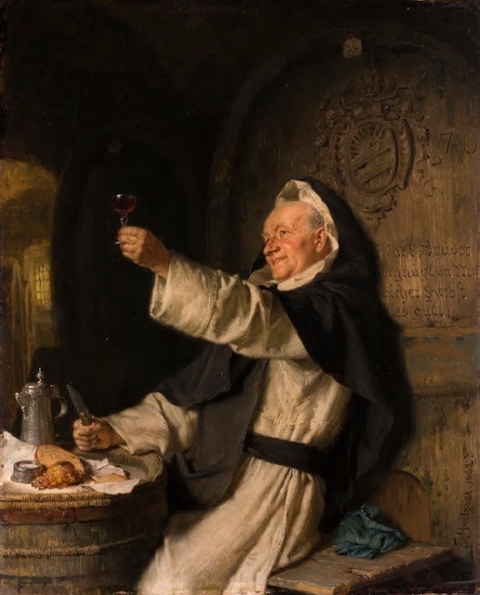
Although
the purpose of the Catholic Church is to bring souls to Heaven, she
has also made life here on earth more pleasant in a number of ways.
Consider the following:
Wine
predates Christianity by centuries, but it was monks who largely
preserved viniculture during the Middle Ages. Religious orders such
as the Benedictines and (later) Jesuits became expert winemakers;
many only quit because their lands in Europe were confiscated by the
modern State in the name of secularization.
Pressed
by the duty to celebrate the Eucharist, Catholic missionaries brought
their knowledge of vine-growing with them to the New World. Wine
grapes were first introduced to California by Blessed Junipero Serra
and his Franciscan brethren, and the rebirth of the California wine
industry after Prohibition was thanks in large part to a chemistry
teacher and LaSalle Christian Brother named Brother Timothy. There
are similar stories about the origins of vineyards in Argentina and
Australia. The Jesuits,
for instance, founded the oldest winery in South Australia’s Clare
Valley when they purchased 100 acres of land in 1851 and planted a
vineyard to make sacramental wine. Named Sevenhill Cellars after the
seven hills of Rome, the operation is still supervised by a Jesuit
with the title of Winemaker and produces “notably sturdy Cabernet
Sauvignons of high colour, huge flavor and long life.”
Pious
men not only preserved and promulgated oenology; they also advanced
it. The méthode
champenoise was
invented by a Benedictine monk whose name now adorns one of the
world’s finest champagnes: Dom Pérignon. According to the story,
when he sampled his first batch, Perignon cried out to his fellow
monks: “Brothers, come quickly. I am drinking stars!” Monks and
priests even found new uses for the grape. The Jesuits, for instance,
are credited with improving the process for making grappa in Italy
and pisco in South America (both of which are grape brandies).
Similarly, although beer may have been invented by the ancient Egyptians, it was perfected by the medieval monasteries that gave us modern brewing as we know it: one saint (Arnold of Soissons) has even been credited with inventing the filtration process. To this day, the world’s finest beer is made within the cloister—specifically, within the cloister of a Trappist monastery. Other orders, such as Carmelites and the Paulaner monks, have contributed very fine beers as well.
Equally
impressive is the Catholic contribution to distilled spirits. Whiskey
was invented by Irish monks, who probably shared their knowledge with
the Scots during their missions. Chartreuse, the world’s most
magical liqueur, was perfected by Carthusian monks and is still made
by them. Bénédictine D.O.M. was invented by Dom Bernardo Vincelli
to “fortify and restore weary monks.” Frangelico, which today
comes in a brown bottle shaped like a monk, was invented by a hermit
of that name during his solitude by experimenting with various nuts,
herbs and berries he had gathered. Rompope, a kind of Mexican eggnog,
was invented by nuns in Mexico when it was still a Spanish colony.
Maraska liqueur was
invented by Dominican apothecaries in the early sixteenth century.
Labels:
Arts and Culture,
Catholic practices,
Church history,
History,
Humor,
Tradition
Fr. Louis Bouyer, "The Catholic Church in Crisis" (1978)
Translated by John M. Pepino HERE (July 6, 2015). Excerpts sent to me by Guy Noir with these words:
My old literary friend-in-faith Louis Bouyer...Acquaintance of Tolkien, Ratzinger, and Ignatius Press's Fr. Fessio, among others, and (if I remember correctly) dissertation advisor to Hans Kung...I have read several reports that he was a bit the incorrigible hothead, and may have made some enemies at a pace only a bit slower than he made friends. Or something like that. And I am often not sure how much of him I quite translate properly from his French mindset.But he seems to have been more conservative than not, and more concerned with preserving tradition and Scripture than revising them.I hope his memoirs make it into an English translation at some point, as a counterpoint or stereophonic accompaniment to Yves Vinegar if nothing else.
Wherever one may be inclined to place Louis Bouyer on the theological-ecclesial spectrum, he was clearly an important thinker, as his books attest (not least his poorly-translated but excellent The Spirit and Forms of Protestantism). Here are Noir's excerpts (his emphases) from Bouyer's long essay, "The Catholic Church in Crisis":In the meantime, this is striking, as much as I can make sense of without much knowledge of French Catholicism... The last lines remind me of an observation I think I read in TIME Magazine years ago, that as much as liberal theologians have disdained Evangelicals, they sort of have to admit that Evangelicals are among the few people actually worrying about thinking theologically. Ditto that for the SSPX in Catholicism...
[...]"The Lefebvre affair” deserves a close investigation. At first glance, one may think that it reveals only the somewhat strange mentality, a ghetto mentality, of Catholics who are incapable of coming out of their isolation, of their life within a closed community in a safeguarded dream. In reality, once one examines it seriously, it reveals a deep malaise in French Catholicism and, therefore, in French society as a whole. And it would be a mistake to believe that this malaise is a recent one: it goes back a long way and its symptoms will never be healed so long as we refuse to go back to its sources...
Labels:
Modernism,
People,
SSPX,
Tradition,
Traditionalists,
Vatican II
Sunday, July 05, 2015
Tridentine Masses coming to metro Detroit and east Michigan this week

Tridentine Masses This Coming Week
-
Sunday
- Sun. 07/05 9:30 AM: High Mass at St. Josaphat, Detroit (6th Sunday after Pentecost - 2nd class)
- Sun. 07/05 9:30 AM: High Mass at Assumption Grotto, Detroit (6th Sunday after Pentecost - 2nd class)
- Sun. 07/05 9:45 AM: High Mass at the Chapel of the Academy of the Sacred Heart, Bloomfield Hills (6th Sunday after Pentecost - 2nd class)
- Sun. 07/05 2:00 PM: High Mass at St. Alphonsus Church, Windsor, Canada (6th Sunday after Pentecost - 2nd class)
- Sun. 07/05 3:00 PM High Mass St. Matthew Catholic Church, Flint (6th Sunday after Pentecost - 2nd class)
Monday
- Mon. 07/06 7:30 AM: High or Low Mass (varies) at Assumption Grotto, Detroit (Feria - 4th class)
- Mon. 07/06 7:00 PM: Low Mass at St. Josaphat, Detroit (Feria - 4th class)
- Tue. 07/07 7:00 AM High or Low Mass (varies) at Assumption Grotto, Detroit (Sts. Cyril & Methodius, Bishops & Confessors - 3rd class)
- Tue. 07/07 7:00 PM: High Mass at Holy Name of Mary, Canada (Sts. Cyril & Methodius, Bishops & Confessors - 3rd class)
- Wed. 07/08 7:30 AM: High or Low Mass (varies) at Assumption Grotto, Detroit (St. Elizabeth of Portugal - 3rd class)
- Thu. 07/09 7:30 AM: High or Low Mass (varies) at Assumption Grotto, Detroit (Feria - 4th class)
Friday
- Fri. 07/10 7:30 AM: High or Low Mass (varies) at Assumption Grotto, Detroit (Seven Holy Brothers, and Sts. Rufina & Secunda - 3rd class) [First Friday]
- Fri. 07/10 7:00 PM: Low Mass at St. Josaphat, Detroit (Seven Holy Brothers, and Sts. Rufina & Secunda - 3rd class)
Saturday
- Sat. 07/11 7:30 AM: High or Low Mass (varies) at Assumption Grotto, Detroit (Saturday of Our Lady - 4th class, or St. Pius I - 4th class)
Sunday
- Sun. 07/12 9:30 AM: High Mass at St. Josaphat, Detroit (7th Sunday after Pentecost - 2nd class)
- Sun. 07/12 9:30 AM: High Mass at Assumption Grotto, Detroit (7th Sunday after Pentecost - 2nd class)
- Sun. 07/12 9:45 AM: High Mass at the Chapel of the Academy of the Sacred Heart, Bloomfield Hills (7th Sunday after Pentecost - 2nd class)
- Sun. 07/12 2:00 PM: High Mass at St. Alphonsus Church, Windsor, Canada (7th Sunday after Pentecost - 2nd class)
- Sun. 07/12 3:00 PM High Mass St. Matthew Catholic Church, Flint (7th Sunday after Pentecost - 2nd class)
Tuesday
Wednesday
Thursday

Tridentine Community News - Bishop Hanchon to celebrate Juventútem TLM at St. Paul on the Lake, Flint TLM moves to Fr. Zach Mabee's parish (St. Matthew's), "IKEA churches," Mass schedules

"I will go in unto the Altar of God
To God, Who giveth joy to my youth"
Tridentine Community News by Alex Begin (July 5, 2015):

Juventútem Mass Update: Blessed Sacrament Cathedral and St. Paul on the Lake

Bishop Donald Hanchon had to change his plans to celebrate a Mass for Juventútem this summer. Originally His Excellency was scheduled to celebrate a Mass on Friday, July 31 at Detroit’s Blessed Sacrament Cathedral. Due to a scheduling conflict, Bishop Hanchon will now celebrate a Mass in the Extraordinary Form on Friday, August 28 at 7:00 PM at St. Paul on the Lake Parish in Grosse Pointe Farms [pictured]. St. Paul was the site of a funeral Mass in the Extraordinary Form a few years ago and is a beautiful and appropriate site for the Traditional Liturgy. The Mass at Blessed Sacrament Cathedral on Friday, July 31 at 7:00 PM will go on as scheduled, to be celebrated by another priest yet to be determined. Archbishop Vigneron still intends to be present and preach the homily.
Flint Tridentine Mass Relocates to St. Matthew Church
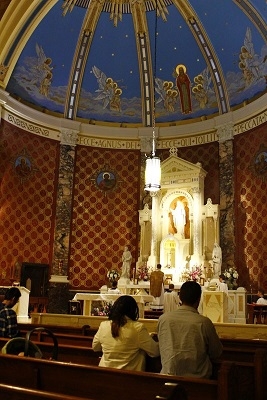
Good things come to those who wait: This Sunday, July 5, the Flint Latin Mass Community takes up residence at its new home, St. Matthew Church in downtown Flint. St. Matthew is Flint’s most ornate historic church, preserved in immaculate condition. The adjacent photo by Juventútem Michigan is of a Tridentine Mass that was held there on September 21, 2012. The superior acoustics, grand scale, and classic architectural features of St. Matthew are sure to bode well for the future of Michigan’s first post-Vatican II Latin Mass community.
The new home comes with a bonus: Newly ordained priest Fr. Zach Mabee has been assigned there as Parochial Vicar. Fr. Mabee celebrated his first Holy Mass in the Extraordinary Form on June 23 at St. Thomas the Apostle in Ann Arbor, just a few days after ordination. This will be the first time that the Flint community will have a priest residing in its host parish able to celebrate the Traditional Mass.
Masses will be held at St. Matthew on Sundays at 3:00 PM, one hour earlier than Mass had been held at their prior home of All Saints Church.
National Catholic Register on “IKEA Churches”
A thought-provoking column by film critic Steven Greydanus appeared on the National Catholic Register newspaper’s web site on June 8. Commenting on the visceral differences between bland, modern churches and ornate, historic churches, the writer opined: “It is no accident that artists raised in and shaped by historic Catholic tradition went on to make visually and imaginatively stunning movies like Vertigo and Rear Window... What about those raised in spartan IKEA-style churches, with blandly soothing music and genially anemic homilies? Will they produce artists inspired to create great art?
"More importantly, will their people be inspired to lead heroic, virtuous lives? And, if so, will it be because of those IKEA-style spartan spaces, or in spite of them?”
Tridentine Masses This Coming Week
- Mon. 07/06 7:00 PM: Low Mass at St. Josaphat (Feria)
- Tue. 07/07 7:00 PM: Low Mass at Holy Name of Mary (Ss. Cyril & Methodius, Bishops & Confessors)

Labels:
Catholic opinion,
Detroit,
Latin Mass,
Liturgy,
Mass,
News,
People,
Places
Fr. Perrone: this is no time for oblivion or indolence
Father Perrone, "A Pastor's Descant" (Assumption Grotto News, June 28, 2015):
I wonder how cognizant people are about the true state of things at this time. My guess is that they are not much aware, or at least not all that much troubled by them. I’ve avoided apocalyptic warnings to you for the good reason that they would be false. Only God knows for sure when the travail of the final days will be upon us. This does not mean, however, that there cannot be a time great turmoil in the world–a time of disturbances which afflict the entire societal body in the political, moral, and religious areas of life–which is to say, in every aspect.
The near collapse of order in beneficent government, national and worldwide, in societal structures, in education, the military, in law and judiciary, in education and arts, in economy and–hard to admit it–even in the Church, does not seem overmuch to worry many people, because they’ve been lulled into reverie by an enveloping, all-pervading sensuality. The palliative effect of pleasures which distract our minds and cloud our judgment tends to make us oblivious to the disorder all around us: the effect being much like an anaesthetic on a body suffering some pathological condition. Pain is a warning that something’s amiss that needs remedying. Covering over problems with blithe distractions from sensual comforts allows decay unattended to advance, to worsen.Men’s ambition and pride lead to resentment of authority; their inclination towards evil, and especially towards sexual indulgence, leads them to want to give way to outpourings of their lawless passions (anger, lust and disregard for law and discipline); and these in turn make men turn away from God and prepare them to become practical atheists, which is to say, agnostics. It is only at this last phase that we begin to see clearly that there’s more than human ambition and weakness behind the ensuing general disorder–that it is demonically inspired. In any case, whether we are willing to believe in the Enemy’s hand in this or not, we are all feeling the effects of the advancing chaos in the disharmony in our marriages and families, in our ineffective educational attempts in our schools, in the squeeze that holds our money and property, in the ever-wider encroachment of big government over more and more aspects of our lives, in the disturbances and discomfort we are feeling by being in a Godless public, in the uncertainty and fears we experience as ominous, impending calamity, in the division in the Church, etc.Much more needs to be said about these things that can’t be aired here. But my reasons for bringing them up are 1) to assure that all this is not right, is not normal, and is decidedly deadly for continuance in an ordered world; 2) to speculate about what the right response should be in the face of this distorted scene. Responses are basically of two kinds: a) offensive action which seeks to rectify the troubles by opposing the many seducing errors and the moral decay; b) prayer and sacrifice, both for restoration of order and for making reparation for damages already done. These two forms are often posed as being in tension with each other: the ‘direct confrontation approach’ or the more ‘indirect’ and (seemingly) ‘passive.’ In truth, I can’t say that there is an alternative: both are needed. We need front-line fighters and we need prayer-warriors (pardon that gooey expression). What we cannot do is to become idle and numb, indifferent and unconcerned, allowing evil to go unopposed, and thus to advance.If I am undecided about which of these to recommend to you the more, I would, as your pastor, say at least this much with utter confidence: you must stop your own slinking into the myriad forms of evil that are rotting souls. You simply cannot give way to your passions–which are the internal originators of all the disorder and chaos in society and in the Church. You, in simple terms, have got to oppose the sinful inclinations that induce you to commit your sins. Never mind the terrible things other people are doing, how bad the world is getting, how dizzying the turmoil in the Church. Be saintly, and do not budge from the way of righteousness. Be tough on yourselves and be holy people. The reform of the world begins with you, in your own soul. Then, and only then, should you proceed with your plan of righting the wrongs of others. This program is a version of what our Lord Himself said: remove the plank in your own eye before removing the splinter in the eyes of others.Don’t mistake my meaning. I am not suggesting that we should not oppose the tremendous evils that are upsetting the God-willed harmony and order of the world and the Church. We must oppose these. Nor am I saying that we should not be making the much-needed Eucharistic holy hours to appease divine justice and petition divine intervention. We, however, must not be hypocrites, outwardly valiant and righteous but inwardly unconverted. What is inexcusable is indolence and apathy and, of course, complicity in the great movement to overthrow the God-given order of truth, goodness, beauty, and holiness, a movement which is not fundamentally a thing but a destructive and malevolent person who rails against God and seeks to frustrate His plans for the salvation of the human race.Fr. PerroneP.S. This will be my last Descant for a while as I take my summertime lease for mental and physical refreshment. Fr. John, to whom I confidently entrust your pastoral care, will no doubt graciously supply in my absence.
Labels:
Church and state,
Culture war,
Sex,
Sin,
Spirituality
Rasmussen: "Support Grows for States to Ignore Federal Courts"
Rasmussen Reports, "Support Grows for States to Ignore the Federal Courts" (July 3, 2015).
[Hat tip to D.M.]
[Hat tip to D.M.]
Labels:
Culture war,
Homosexualism,
Law,
News
Canonist Peters on the fatal flaw in Scalia's dissent
Edward Peters, "Antonin Scalia as the measure of how far we have to go" (In the Light of the Law, June 29, 2015):
Let me illustrate using an example from C.S. Lewis:
The very best introduction to the contemporary crisis in jurisprudence is Law and Revolution: The Formation of the Western Legal Tradition, which ought to serve our times as the equivalent of William Blanckstone's Commentaries on the Law of England for his time.
which ought to serve our times as the equivalent of William Blanckstone's Commentaries on the Law of England for his time.
Related: Ann Barnhardt, "On Scalia’s Dissent" (Judica me, June 26, 2015).
But here’s the problem: Scalia’s dissenting opinion, while correctly arguing that Congress, and not the Courts, is the law-making branch of government in America, opens with this line: “The law can recognize as marriage whatever sexual attachments and living arrangements it wishes … It is not of special importance to me what the law says about marriage.”While Scalia's dissent is brilliant in many ways, but while his personal sentiments are clearly Catholic, his legal reasoning displays the fatal flaw juridical positivism. What does this mean? In a nutshell, it means that law has no basis other than what is posited by human legislation. In other words, the basis of human law in natural law is no longer assumed.
Let me illustrate using an example from C.S. Lewis:
EVERY ONE HAS HEARD people quarreling. Sometimes it sounds funny and sometimes it sounds merely unpleasant; but however it sounds, I believe we can learn something very important from listening to the kinds of things they say. They say things like this: "How’d you like it if anyone did the same to you?"--‘That’s my seat, I was there first"--"Leave him alone, he isn’t doing you any harm"--"Why should you shove in first?"--"Give me a bit of your orange, I gave you a bit of mine"--"Come on, you promised." People say things like that every day, educated people as well as uneducated, and children as well as grown-ups.This is about the most concise illustration and explanation of natural law I can think of. The only justice of the Supreme Court who still shows any evidence of adhering to natural law as a foundation for human law is Clarence Thomas. (Interestingly, Joe Biden opposed Robert Bork's nomination to the SCOTUS because he DIDN'T believe in natural law, then opposed Clarence Thomas' nomination because he DID believe in it, which tells us something about the character of Catholic politicians these days.)
Now what interests me about all these remarks is that the man who makes them is not merely saying that the other man’s behavior does not happen to please him. He is appealing to some kind of standard of behavior which he expects the other man to know about. And the other man very seldom replies: "To hell with your standard." Nearly always he tries to make out that what he has been doing does not really go against the standard, or that if it does there is some special excuse. He pretends there is some special reason in this particular case why the person who took the seat first should not keep it, or that things were quite different when he was given the bit of orange, or that some thing has turned up which lets him off keeping his promise. It looks, in fact, very much as if both parties had in mind some kind of Law or Rule of fair play or decent behavior or morality or whatever you like to call it, about which they really agreed. And they have. If they had not, they might, of course, fight like animals, but they could not quarrel in the human sense of the word. Quarreling means trying to show that the other man is in the wrong. And there would be no sense in trying to do that unless you and he had some sort of agreement as to what Right and Wrong are; just as there would be no sense in saying that a footballer had committed a foul unless there was some agreement about the rules of football.
The very best introduction to the contemporary crisis in jurisprudence is Law and Revolution: The Formation of the Western Legal Tradition,
Related: Ann Barnhardt, "On Scalia’s Dissent" (Judica me, June 26, 2015).
Defying Church, Fordham prof. 'marries' another man; administration supports
John Burger, "Fordham University Theology Department Chariman 'Marries' Another Man" (aleteia, July 4, 2014):
The New York Times, which up until a few years ago, declined running wedding announcements involving same-sex couples, reported that J. Patrick Hornbeck II “married” Patrick Anthony Bergquist Saturday at St. Bartholomew’s Episcopal Church in Manhattan. The ceremony took place June 27, just a day after the US Supreme Court legalized same-sex “marriage” nationwide. That would not have been necessary legally, since New York State has allowed gay "marriage" since 2011. But the ceremony was conducted before the Episcopal Church in America voted this week to allow same-sex "marriage" rites in its churches.[Hat tip to M.G. and E.P.]
When asked whether Fordham was concerned about having a professor of theology whose lifestyle choice is in opposition to the teaching of the Catholic Church about marriage, a spokesman for the university said Hornbeck has the right to get married.
“While Catholic teachings do not support same-sex marriage, we wish Professor Hornbeck and his spouse a rich life filled with many blessings on the occasion of their wedding in the Episcopal Church,” said Bob Howe, Fordham's senior director of communications. “Professor Hornbeck is a member of the Fordham community, and like all University employees, students and alumni, is entitled to human dignity without regard to race, creed, gender, and sexual orientation."
Friday, July 03, 2015
Catholics: What part of this is not true or right?
Michael Voris, "Excommunicate Them All!" (The Vortex, July 1, 2015). He's talking about people like Supreme Court Justice Anthony Kennedy. Harsh? Maybe. Or perhaps you would prefer a rainbow-colored Care Bear to cuddle with on your way to your ISIS execution or the Last Judgment?
Labels:
Canon law,
Confusion,
Culture wars,
Homosexualism,
Law,
Magisterium,
Voris
Thursday, July 02, 2015
Big Brother v. the people

"War is peace. Slavery is freedom. Ignorance is strength." Remember those words from George Orwell?
Big Brother has been doing his best to impose totalitarian mind-control on us through it's Ministry of Truth [TM] ("news media" in the popular imagination), which not only tells us what's going on but how to feel about it. The extension of that effort at control through social and entertainment media has been particularly effective via the not-so-subtle social pressures of "political correctness." The
Despite these efforts, about half the population remains unaccountably recalcitrant, refusing (so far) to bend to the will of Big Brother and his media elites. Rasmussen Reports' "Marriage Update" (June 25, 2015) states that 50% of Likely U.S. Voters still consider marriage a religious institution, in line with past sentiments. Of the 76% who are either now married or have been married, 55% consider marriage a religious institution, while 34% consider it a civil one.
In fact, the number of Likely U.S. Voters who consider marriage a religious institution rather than a civil one has unaccountably risen from 36% to 43% in most recent polling. "Support for gay marriage reached a high of 48% almost a year ago and again in December, but then fell to 42% in February, tying the all-time low first reached in late 2013."
Power to the people! Protect your mind! Rage against the machine! Resist Leviathan! Resist Newspeak! Farenheit 451! ETWAGIHE!
Labels:
Culture,
Culture wars,
Homosexualism,
Humor,
Marriage,
Media,
Politics,
Society
The imperial judiciary
John Hayward, "The King v. Burwell aftermath" (Breitbart, June 25, 2015):
One of the core problems with a decision like the Supreme Court’s King v. Burwell ruling is that it does the opposite of what a Supreme Court presided over by justices-for-life is supposed to do.[Hat tip to Sir A.S.]
As Chief Justice Roberts makes abundantly clear in his ruling, he looked at politics, not the law, concluding that upholding the clear text of the Affordable Care Act would have killed it, and inflicted chaos on a health insurance system already driven mad by ObamaCare.
He made a political judgment – with copious pressure from President Obama and his followers, and the weight of his own previous decision to put politics above the law to preserve the individual mandate – that the Affordable Care Act was a writ of nearly-unlimited power to do what its framers say they want to accomplish today, not a law with a balance of both power and responsibility based on what it said at the moment it was signed.
This is a very bad precedent to set, especially if Roberts’ reasoning is followed to the conclusion that the bigger and more ambiguously-written a law is, the more untrammeled executive power it grants. No matter what ultimately becomes of ObamaCare, that will come back to haunt us in many other contexts in the future.
... I am of the opinion that tough political outcomes are a burden worth bearing to preserve the rule of law, but here we are instead: Democrats doing a creepy “ALL DEBATE IS NOW OVER!” victory dance to celebrate the Constitution-smashing preservation of a law the American people don’t like, whose passage has already blown them into a congressional minority, and which they own 100 percent. It would be easier to maintain optimism about Republicans fighting on such favorable political terrain if they had demonstrated an institutional talent for fighting winning battles on solid ground, and doing important things with the power thus obtained.
The American people are getting a raw deal out of ObamaCare, but the President was not wrong when he crowed today that the law is working the way he wanted it to. The American system has been bent and twisted beyond recognition by the agonizing pain of digesting a law that conflicts with such basic values as the freedom of religion, and even the freedom to decline engaging in commerce. The “consent of the governed” matters less than ever. The amount of money sucked down by ObamaCare and distributed to the government’s Little Partners in the insurance industry is staggering. A huge swath of the formerly independent middle class is now helplessly dependent on subsidy payments, whose termination can be threatened if they get any funny ideas about putting the Leviathan State on a diet.
... The Left will redouble its efforts to silence and marginalize Americans who are suffering under ObamaCare..... Most people get a queasy feeling when they hear the phrase “the ends justify the means.” They know that’s wrong, and they know those words have been cited to justify tyranny and evil. The Roberts decision is wholly based on that idea. The American system was founded on the opposite ideal: that the ends do not justify the means, the system should not be shredded to impose a “good idea” with haste, the rule of law is more important than any goal that could be achieved by discarding it.
... A “law” that imposes no restraint or obligation on the government, not even the need to respect the plain text of the law itself, contains a payload of power that should be unacceptable to every patriotic American. Sometimes Republicans talk about the Constitution as an object of worship, an abstract idea they hold in reverence, without discussing its practical effect upon the real world. Well, Chief Justice Roberts just gave us a very powerful example of how the abandonment of Constitutional principle disrupts the everyday lives of ordinary people. Use it.
Labels:
Culture wars,
Economy,
Healthcare,
Law,
Politics
Wednesday, July 01, 2015
White Rainbow House: Calling evil good

The underground correspondent we keep on retainer in an Atlantic seaboard city that knows how to keep its secrets, Guy Noir - Private Eye, was clearly troubled about something, but kept a cool head. He wrote:
I keep stewing over the Supreme Court decision, primarily because I read no commentary anywhere that quite touches on my gut reaction.
Marriage is about children, gender matters, court over-reach, impending persecution... blah blah blah.
What I wonder is this:
How can any Catholic leader not connect the dots this way...Homosexual sex is bad (last I checked, we can call things that are sinful 'bad')......Not to mention wasting a lot of taxpayers' monies on schmoozing a constituency base. At First Things a guy from Focus on the Family goes on and one about how 'inappropriate' it is to hijack the White House for any cause. I couldn't stand it. That's not what's appalling. It's that the White House is being hijacked for what clear-thinking Christians know is a fundamentally bad and -- yes -- evil cause. Enabling sin in such a rhetorical manner... and the effect this will likely have in swaying the black church to boot ... Depressing and almost unforgivable in my book. [Emphasis added]
Even dignified people can besmirch their dignity.....
It's close to impossible to read Romans 1 or the documents of the CDF and not get the idea that homosexuals who are sexually active besmirch their dignity.....
Thus when the White House looks like this, it is calling evil good and fundamentally besmirching humanity's dignity. It's the President graphically supporting ant-Catholic, anti-Christian, and ungodly living.
Labels:
Church and state,
Confusion,
Doctrine,
Homosexualism,
Law
Melinda Gates: 'I'm Living Out My Faith in Action'
Interview by Timothy C. Morgan, "Melinda Gates: ‘I’m Living Out My Faith in Action’" (Christianity Today, June 29, 2015): "One of the wealthiest and most controversial women in the world believes that all lives have equal value. She’s willing to spend $3.6 billion a year to prove her point." Anti-abortion, but pro-contraception ... and interesting.
Guy Noir, our underground correspondent, wrote about this quite interesting interview:
Guy Noir, our underground correspondent, wrote about this quite interesting interview:
At the end she mentions an extremely popular devotional book penned I think by an ex-L'Abri'er or an author with some claimed influence from there.
But also notice the CT interviewer refuses to actually engage her at all on what her faith means in terms of concepts. Equality of all and good works and a shout out to Pope Francis.
Strange times.
Labels:
Catholic opinion,
Confusion,
Culture wars,
People
Cornelio Fabro (1911 – 1995)
Cornelio Fabro: Philosopher of Esse and of Freedom
Cornelio Fabro (1911 – 1995) is among the most important philosophers of the 20th century because of his studies of the metaphysics of St. Thomas Aquinas and for his vast knowledge of modern philosophy and classical Christian realism from the perspective of Kierkegaard's metaphysical existentialism.
The goal of the Cornelio Fabro Cultural Project is to place the entire intellectual production of this Italian philosopher at the disposition of all, in both printed and digital form, including audio, video, and texts. The Complete Works will be translated into English and Spanish, and the most important volumes into other languages as well.
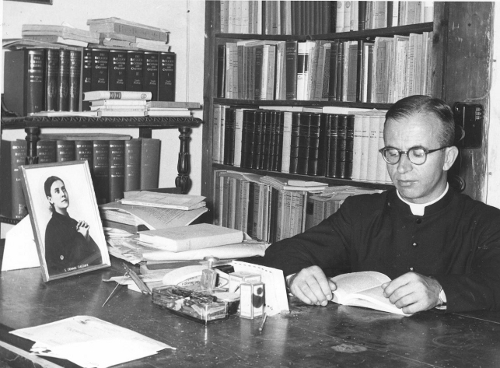
"The birth of freedom has been the only and essential task, the intensive point of my
journey which is still in motion, because the life of the spirit does not allow breaks... Truth,
therefore, in freedom, and freedom for the truth." C.F.
Cornelio Fabro (1911 – 1995) is among the most important philosophers of the 20th century because of his studies of the metaphysics of St. Thomas Aquinas and for his vast knowledge of modern philosophy and classical Christian realism from the perspective of Kierkegaard's metaphysical existentialism.
The goal of the Cornelio Fabro Cultural Project is to place the entire intellectual production of this Italian philosopher at the disposition of all, in both printed and digital form, including audio, video, and texts. The Complete Works will be translated into English and Spanish, and the most important volumes into other languages as well.

"The birth of freedom has been the only and essential task, the intensive point of my
journey which is still in motion, because the life of the spirit does not allow breaks... Truth,
therefore, in freedom, and freedom for the truth." C.F.
Subscribe to:
Posts (Atom)

